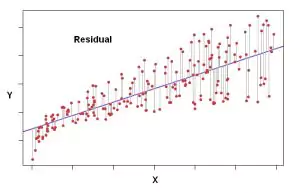In the realm of statistical analysis, response variables play a crucial role in investigating the relationships between different factors and variables. They provide valuable insights into the effects and outcomes of various phenomena under study. In this article, we will delve into the concept of response variables, exploring their definition, significance, and practical applications in statistical research. For students struggling to understand these concepts, seeking the assistance of a statistics homework helper can be the right choice. We will also discuss the key differences between response variables and other types of variables, such as explanatory variables. So, let’s begin our journey of unraveling the intricacies of response variables in statistics.

✅ AI Essay Writer ✅ AI Detector ✅ Plagchecker ✅ Paraphraser
✅ Summarizer ✅ Citation Generator
Understanding Variables in Statistics
In statistics, variables are attributes or characteristics that can assume different values. They provide the building blocks for conducting meaningful research and analyzing data. Examples of variables include height, age, income, grades, and various other measurable or categorical factors.
Types of Variables can be broadly classified into different types, such as categorical variables and numeric variables. Categorical variables are further categorized into binary, nominal, and ordinal variables, each representing different types of data.
Response Variables
A response variable, also known as a dependent variable, is the core variable of interest in a statistical study. It represents the outcome or result that researchers aim to explain, predict, or understand. In other words, a response variable is the variable that changes or responds based on the manipulation or observation of other variables.
Response variables possess specific characteristics that distinguish them from other types of variables. They exhibit variability, meaning their values can differ across different observations or subjects. Response variables are also influenced by one or more explanatory variables, which are manipulated or controlled during the research study.
Response variables are vital in statistical research as they provide insights into the impact and relationships between different factors. They help researchers evaluate the effectiveness of interventions, compare outcomes across different groups, and make informed decisions based on the observed results. Response variables serve as a key component in statistical modeling and hypothesis testing, enabling researchers to draw meaningful conclusions from their data.
Differentiating Response Variables from Explanatory Variables
Explanatory Variables: A Brief Overview Explanatory variables, also known as independent variables, are the factors or variables that researchers manipulate or control during a study. These variables are believed to have an effect on the response variable. Explanatory variables play a crucial role in determining the causes or influences behind the observed outcomes.
While both response and explanatory variables are important in statistical analysis, they differ in their roles and characteristics. The key differences include:
- Nature and Purpose: Response variables represent the outcomes or effects, while explanatory variables explain the causes or influences.
- Manipulation: Explanatory variables are manipulated or controlled by the researcher, whereas response variables change based on the manipulation of explanatory variables.
- Dependence: Explanatory variables are independent variables, while response variables depend on the explanatory variables.
- Focus: Explanatory variables are of primary interest in experimental research, while response variables are the core focus in observational studies.
Explanatory and Response variables are interconnected in statistical analysis. Changes in the explanatory variables can lead to changes in the response variable, reflecting a cause-and-effect relationship. In some cases, an explanatory variable may act on a response variable indirectly, through the mediation of other variables. Understanding the interplay between these variables is crucial for accurate interpretation and analysis of research findings.
Examples of Response Variables in Statistical Studies
Case #1. In a research study comparing two treatment procedures for breast cancer patients, the response variable would be the survival time of the patients. The type of therapy administered would serve as the explanatory variable, with researchers examining whether it affects the response variable (i.e., survival time).
Case #2. In a study investigating the correlation between height and age, the response variable would be the age of individuals, while the explanatory variable would be their height. Researchers would analyze whether height can predict or explain variations in age within a sample population.
Case #3. In an experiment comparing the effectiveness of two fertility treatments for pandas, the response variable would be the fertility rate, while the explanatory variable would be the type of fertility treatment administered. Researchers would measure the impact of different treatments on the response variable to determine their effectiveness.
Case #4. In an experiment comparing two different approaches to public speaking instruction, the response variable would be the anxiety level of students. The explanatory variable would be the type of lesson received (new or old approach). Researchers would assess whether the new lesson reduces student anxiety levels more effectively than the old lesson.
Practical Applications of Response Variables
Market Research and Consumer Behavior Studies In market research, response variables can include customer satisfaction levels, purchase behavior, or brand loyalty. By analyzing these response variables in relation to explanatory variables such as pricing, advertising, or product features, businesses can gain valuable insights into consumer preferences and optimize their strategies.
Medical and Pharmaceutical Research In medical and pharmaceutical research, response variables are often health-related outcomes such as disease progression, treatment efficacy, or patient survival rates. These variables help evaluate the effectiveness of interventions, assess the impact of new drugs or therapies, and inform medical decision-making.
Social Sciences and Survey Studies In social sciences, response variables can include measures of educational attainment, income levels, or social attitudes. By examining the relationship between these response variables and various explanatory variables, researchers can gain a deeper understanding of social phenomena, identify patterns, and make evidence-based policy recommendations.
Best Practices for Identifying Response Variables
To identify appropriate response variables, researchers should clearly define their research objectives and formulate hypotheses. Understanding the specific outcomes or effects they want to measure or predict will guide the selection of suitable response variables.
Researchers must carefully design their data collection methods to capture accurate and reliable information regarding the response variables. This may involve surveys, interviews, observations, or experiments, depending on the nature of the study.
Statistical analysis techniques such as regression analysis, analysis of variance (ANOVA), or chi-square tests are commonly employed to analyze response variables. These techniques allow researchers to examine the relationship between response variables and explanatory variables, assess statistical significance, and draw meaningful conclusions from the data.
Conclusion
Response variables are fundamental components of statistical research, providing insights into the outcomes and effects under investigation. By understanding the concept of response variables and their relationship with explanatory variables, researchers can conduct rigorous and insightful analyses. These variables enable researchers to gain a deeper understanding of various phenomena across diverse fields of study, ranging from medicine to social sciences. By carefully selecting and analyzing response variables, researchers contribute to the advancement of knowledge and drive evidence-based decision-making in numerous domains.
FAQ
How to identify the response variable in a research study?
To identify the response variable, focus on the main outcome or result that you want to measure or explain in your study. It is the variable that changes or responds based on the manipulation or observation of other variables. Consider the research objectives and hypotheses to determine the specific outcome of interest.
What are the characteristics of a good response variable?
A good response variable should possess certain characteristics. It should be relevant to the research objectives, measurable or observable, and exhibit variability across the observations or subjects. Additionally, a good response variable should have a clear and interpretable relationship with the explanatory variables.
How do researchers determine the relationship between explanatory and response variables?
Researchers determine the relationship between explanatory and response variables through statistical analysis techniques. These techniques include regression analysis, correlation analysis, analysis of variance (ANOVA), and other multivariate methods. By analyzing the data collected and conducting appropriate statistical tests, researchers can quantify the relationship between these variables.
Can a response variable be categorical, or does it have to be numeric?
Response variables can be either categorical or numeric, depending on the nature of the study and the type of data being collected. Categorical response variables represent distinct categories or groups, while numeric response variables involve numerical measurements or values. Both types of response variables have their respective statistical analysis methods.
Is the response variable always the dependent variable in a statistical analysis?
Yes, in most cases, the response variable is considered the dependent variable in statistical analysis. It is the variable that is believed to be influenced or affected by the explanatory variables. However, it is important to note that the terms “response variable” and “dependent variable” are often used interchangeably.
What are some common methods used to analyze response variables in statistics?
Common methods used to analyze response variables include regression analysis, where the relationship between the response variable and explanatory variables is modeled; analysis of variance (ANOVA) for comparing means across different groups; and chi-square tests for analyzing categorical response variables. Other techniques, such as logistic regression and survival analysis, are also employed for specific types of response variables.
Are there any limitations or considerations when working with response variables?
Yes, there are several considerations when working with response variables. These include ensuring the validity and reliability of the measurements, considering the potential influence of confounding variables, addressing missing data or outliers, and understanding the assumptions associated with the chosen statistical methods. Additionally, the selection of an appropriate response variable should align with the research objectives and the nature of the phenomenon being studied.
How can I choose an appropriate response variable for my research study?
Choosing an appropriate response variable requires careful consideration. Start by clearly defining your research objectives and hypotheses. Identify the specific outcome or effect you want to measure or explain. Ensure that the chosen variable aligns with the research question and is relevant to your study’s context. Consider the feasibility of measuring the variable and its potential relationship with the explanatory variables. Consult with domain experts or statisticians if needed to make an informed decision.
Follow us on Reddit for more insights and updates.





Comments (0)
Welcome to A*Help comments!
We’re all about debate and discussion at A*Help.
We value the diverse opinions of users, so you may find points of view that you don’t agree with. And that’s cool. However, there are certain things we’re not OK with: attempts to manipulate our data in any way, for example, or the posting of discriminative, offensive, hateful, or disparaging material.